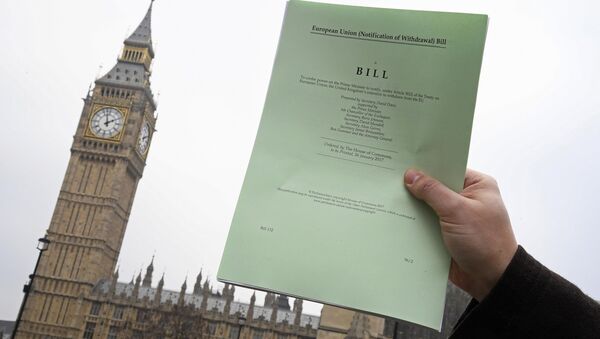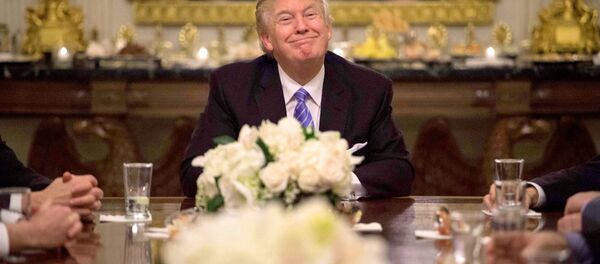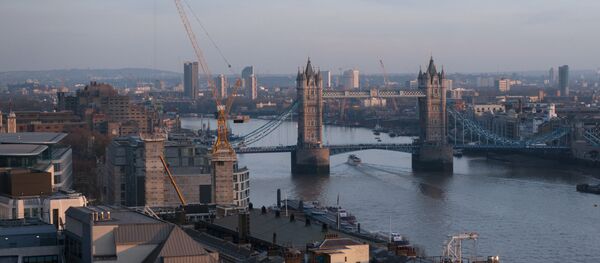The UK should leave the EU as soon as possible and pursue a free-trade policy that drops all import tariffs with the rest of the world, Patrick Minford CBE, Professor of Applied Economics at Cardiff Business School, Cardiff University, told Radio Sputnik.
Minford is one of a group of experts who formed the Economists for Brexit campaign group ahead of the UK referendum on the EU last June.
He said that the leaving the EU would enable the UK to pursue an economic policy of complete liberalization that allows all countries to export to the UK without tariffs, rather than just the EU.
"My advice would be: get rid of these tariffs on day one, without even taking them into the deal, because thething that damages our economy is EU protectionism, the high tariffs and barriers that the EU has erected on agriculture and manufacturers. One of the main costs of being in the EU is this protectionism. Another big thing of course is the regulation enthusiasm of the EU, stopping all sorts of things which are beneficial economically," Minford said.
"What we want to do for our consumers and our domestic economy, is get rid of these barrier to foreign products coming here at world prices, but that's what the EU stops. So, what we want out of these trade deals is something more subtle. We want good relationships with these countries in all sorts of areas, we want recognition of property rights, investment guarantees if things go wrong in foreign investment."
"These sorts of things are important things to agree. But the big thing we need doing straightaway we can do ourselves. Just get rid of these trade barriers that the EU has erected on our behalf, because they damage our consumers, they raise our prices by around eight percent and they warp the structure of our economy towards inefficient industries."
"What we need is competition in our economy, world prices, so we get the best industries competing efficiently in world markets."
"What we want is access to the single market — a bold and ambitious free trade agreement that removes as many barriers as possible, not just because more trade is in the interests of the U.K., but because it is in the interests of the entire population of Europe," Johnson wrote in The Telegraph.
On Friday Prime Minister Theresa May made a speech to members of the US Republican party, where she expressed a desire to sign a new trade deal with the US following Brexit.
"I look forward to pursuing talks with President Trump and his new administration about a new UK-US free trade agreement in the coming months," May said.
However, Minford, a key member of Economists for Brexit who was the only member to provide some economic modelling prior to the referendum, says that in fact the country "doesn't need any trade deals."
"We don't need any trade deals elsewhere to benefit our economy by coming out of the EU trade arrangement. EU trade arrangements damage us because they raise prices inside our economy by the protective margin that the EU erects, which is about 20 percent on food and about 20 percent on manufactures. So they are raising our prices, in those two important areas of our economy by 20 percent."
"The thing we can do directly without any trade agreements at all is just get rid of that and then have trade agreements about other things, of which there are plenty to talk about, with the rest of the world and it doesn't really matter how long they take because the thing that we need straightaway from leaving the EU is to get rid of this protection and bring down the prices for our consumers and create a competitive playing field for our producers."
On Thursday the UK government published its proposed European Union (Notification of Withdrawal) Act, a short bill to give Prime Minister Theresa May the power to notify the EU about the UK's intention to leave the bloc; the bill is slated for debate in parliament in the coming fortnight.
Minford called on parliament to pass the bill, and warned that if MP's don't vote to invoke Article 50, the people who voted for Brexit will feel "betrayed."
"They're impatient that Article 50 hasn't yet been triggered because they're worried about betrayal. Now, if we're betrayed, if the British people feel betrayed because Mrs. May wimps out in some way, then we would have a problem. But that's not going to happen, and they know that's not going to happen. The economy's growing fast, the problem is (that) the Bank of England's got too loose a monetary policy now. Tax revenues are strong, everything that all these remainers said that would happen has been the opposite of the truth."
The UK economy performed above expectations and expanded by 0.6 percent in the fourth quarter of 2016, driven by services and consumer spending, according to the UK Office for National Statistics.
With year-on-year growth of two percent the UK was the fastest-growing G7 economy in 2016, a figure slightly lower than the 2.2 percent growth in 2015.
0.6% rise in #GDP in Q4 2016, with growth dominated by the service sector https://t.co/B1ssP0gbL3
— ONS (@ONS) January 26, 2017
However, the value of the British pound has slumped by 16 percent against the dollar since the June 23 referendum, reaching lows not seen since 1985. It appears that foreign exchange market investors continue to fear the effect of Brexit on the UK's future growth prospects.




